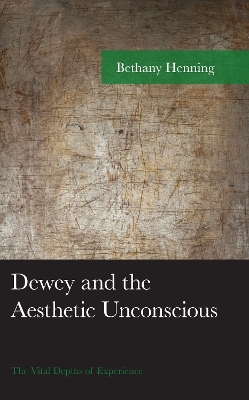
Dewey and the Aesthetic Unconscious
The Vital Depths of Experience
Seiten
2022
Lexington Books (Verlag)
978-1-7936-2021-7 (ISBN)
Lexington Books (Verlag)
978-1-7936-2021-7 (ISBN)
Bethany Henning argues that within the naturalistic strains of American philosophy, there is an implicit theory of the unconscious that finds its fullest expression within the work of John Dewey. Although the unconscious contributes to all experience, it plays a principal role in experiences that are emphatically aesthetic.
John Dewey was the most celebrated and publicly engaged American philosopher in the twentieth century. His naturalistic theory of “experience” generated new approaches to education and democracy and re-grounded philosophy’s search for truth in the needs of life as it is shared and lived. However, interpretations of Dewey after the linguistic turn have either obscured or rejected the considerable role that he gives to the non-discursive dimension of experience. In Dewey and the Aesthetic Unconscious: The Vital Depths of Experience, Bethany Henning argues that much classical American philosophy implicitly recognizes an unconscious dimension of mind that is distinct from Freud’s theory. Although the unconscious that emerges within American thought has never been treated systematically, it found its fullest expression in Dewey’s work, particularly in his theory of aesthetic experience. This dimension of mind illuminates the continuity between nature and culture, and it provides us with an account of why artwork is often successful at communicating meanings from the ecological and intimate dimensions of life, where discourse often fails. If the relationship between the human and the organic world has emerged as the definitive question of twenty-first century life, then the aesthetic unconscious stands as a resource for our ecological and intimate well-being.
John Dewey was the most celebrated and publicly engaged American philosopher in the twentieth century. His naturalistic theory of “experience” generated new approaches to education and democracy and re-grounded philosophy’s search for truth in the needs of life as it is shared and lived. However, interpretations of Dewey after the linguistic turn have either obscured or rejected the considerable role that he gives to the non-discursive dimension of experience. In Dewey and the Aesthetic Unconscious: The Vital Depths of Experience, Bethany Henning argues that much classical American philosophy implicitly recognizes an unconscious dimension of mind that is distinct from Freud’s theory. Although the unconscious that emerges within American thought has never been treated systematically, it found its fullest expression in Dewey’s work, particularly in his theory of aesthetic experience. This dimension of mind illuminates the continuity between nature and culture, and it provides us with an account of why artwork is often successful at communicating meanings from the ecological and intimate dimensions of life, where discourse often fails. If the relationship between the human and the organic world has emerged as the definitive question of twenty-first century life, then the aesthetic unconscious stands as a resource for our ecological and intimate well-being.
Bethany Henning is the Besl Chair for Ethics/Religion and Society in the Philosophy Department at Xavier University.
Contents
Acknowledgements
Introduction
Chapter One: The Aesthetic Confrontation with Nature
Chapter Two: The American Unconscious
Chapter Three: The Feel of the Flesh, the Emergence of Mind
Chapter Four: Eros and the Primacy of the Aesthetic
Chapter Five: Uncomfortable Art and American Trauma
Chapter Six: From the Organic Plentitude of Being
Bibliography
Index
About the Author
| Erscheinungsdatum | 18.03.2022 |
|---|---|
| Reihe/Serie | American Philosophy Series |
| Verlagsort | Lanham, MD |
| Sprache | englisch |
| Maße | 161 x 227 mm |
| Gewicht | 445 g |
| Themenwelt | Geisteswissenschaften ► Philosophie ► Philosophie der Neuzeit |
| Geisteswissenschaften ► Psychologie ► Psychoanalyse / Tiefenpsychologie | |
| ISBN-10 | 1-7936-2021-0 / 1793620210 |
| ISBN-13 | 978-1-7936-2021-7 / 9781793620217 |
| Zustand | Neuware |
| Haben Sie eine Frage zum Produkt? |
Mehr entdecken
aus dem Bereich
aus dem Bereich


